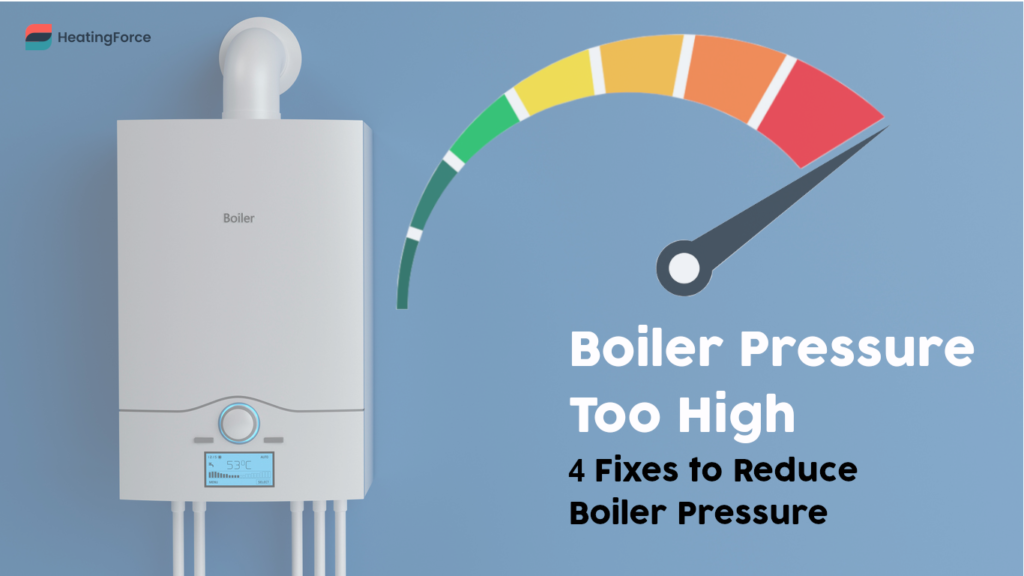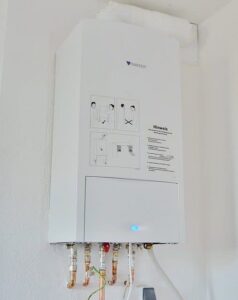Boiler Pressure Too High? 4 Fixes to Reduce Boiler Pressure
Have you been wondering why your boiler pressure so high?
If your boiler’s pressure is too high, this 5-minutes guide will explain why this happens and what should be done to reduce and release the pressure from your boiler. Our tutorial will teach what’s normal pressure for a boiler, common problems that may lead to high boiler pressure and fixes for each and every one.

4 Reasons Your Boiler Pressure Is Too High (And How to Fix Them)
These are the top 4 causes of higher-than-normal boiler pressure:
- The central heating system has been overfilled with water
- Natural expansion from boiler parts
- Pressure release devices in the boiler are failing
- External filling loop is letting-by water.
Now, let’s dive in and explore these causes and talk about ways to fix them.
#1 – Your Boiler’s Heating System Has Been Overfilled
The first and most obvious problem that leads to excessive boiler pressure is an over-pressurised system.
A boiler needs sufficient water in it to operate correctly. So, when experiencing low boiler pressure, owners often represurrise the boiler by topping it up with water via the external filling loop. This stops a “dry fire” scenario that might otherwise damage the pump, heat exchanger, and other expensive parts.
However, if you overfill the system, the extra water can put unnecessary strain on the entire central heating system. This, in turn, causes the dreaded “boiler-pressure-too-high” scenario. High pressure means that copper joints are more likely to fail, the pump’s seals are more likely to blow, and cracks may emerge in the heat exchanger.
The Fix: Open the radiator valve to remove water from the boiler
So, what’s the fix for a boiler pressure too high situation? that’s too high in this scenario? Simply drain water from the heating system.
You have two options here as a point for bleeding the system:
- Drain cock
- Radiator bleed valve
You can remove water from the system via the radiator bleed valve, using a specifically designed radiator key.
Bleeding water from radiators tends to be messy, so have towels ready to cover walls/flooring, and make sure you have a small container to catch the water you’re bleeding from the system. Again, shut off the valve once at 1.3 bar to avoid reducing the pressure too much which can cause other problems like the so-called dry fire.
If you know where the drain cock in your property is, you can connect a small hose and open the valve slightly. This will allow water to escape. With someone helping you, they’ll be able to tell you when the boiler’s pressure gauge displays 1.3 bar, so you can close the valve.
If you remove too much water from the system and end up with low pressure, don’t worry — you can always top it up.
#2 – Boiler Parts Expanding (This Is Normal)
Next, we find a lot of people trying to find faults when their boiler’s pressure rises by around 0.3 bar or less when hot water and heating is on.
Naturally, parts expand when they heat up. So, as your heating/hot water comes on, you’ll see the pressure slowly rise.
However, there should be pressure release devices in your boiler that stop pressure rising too far. So, you should expect to see your boiler’s rise by less than 0.3 bar.
The Fix: Get a professional opinion from a Gas Safe engineer
Feel free to ask your heating engineer to check the boiler’s pressure during the next service. However, small rises in pressure are normal. Once the pressure rise becomes 0.5 bar or more, that usually signifies that there’s a problem with high pressure.
What kind of fuel does your boiler use?
Fixed price online with next day installation
#3 – Pressure Release Mechanisms Malfunctioning
As we’ve mentioned, a rise in pressure of under 0.3 bar is normal for boilers. But, if you notice that the higher the pressure goes, the quicker it increases — and it’s rising above 0.5 bar — there is likely to be a pressure release issue.
Different boilers have different parts to help release pressure when it’s at its highest. This includes expansion vessels, auto air-vents, pressure release valves and so on.
If these units fail, they might not be operating in the way they should. Instead of releasing pressure, they are containing it. And that means that the boiler’s excess pressure has nowhere to escape.
Not only could this mean you have a faulty pressure release unit, it means you’re putting excess strain on many boiler components. And eventually, the boiler will get to a point where the pressure is simply too high, and it will lock out.
The Fix: Let a boiler professional assess whether the pressure is too high.
You’ll need to call a boiler repair engineer or your boiler care company to request an assessment of your boiler. They’ll be looking at anything that helps to relieve pressure from your appliance. It’s likely that a faulty part needs replacing before the boiler can once again keep its pressure consistent.
And, to make sure the quote they’re offering is reasonable, you can see average boiler repair costs here.
#4 – Filling Loop Isn’t Fully Closed
If you notice that your boiler pressure rises even when heating/hot water isn’t on, it’s likely that the filling loop (the device used to fill the system with water) isn’t fully turned off.
If the valve is stuck partially open (or hasn’t been closed fully), that’s going to constantly leak small amounts of water into the system. When this is the case, the boiler pressure will rise constantly, even when hot water and heating aren’t currently on.
The Fix: Disconnect the external filling loop on your boiler.
Call a Gas Safe registered engineer and ask them to disconnect the external filling loop. With both valves closed, it shouldn’t be letting by any water. If it is, that’s going to make your boiler pressure too high.
If the engineer notices that a valve is getting partially stuck open, a replacement filling loop is going to be needed.
What Pressure Should Your Boiler Be?
But, before trying to fix the problem, you need to understand exactly what your boiler pressure gauge needs to show to ensure that the pressure is neither too high nor that the boiler is losing pressure causing it to be too low. Is, in fact, your boiler pressure too high?
Most boiler manufacturers recommend an ideal boiler pressure of 1.3 bar (check your owner’s manual).
What Boiler Pressure Is “Too High”?
According to most manufacturers (Ideal, Viessmann, Worcester Bosch) boiler pressure rising above 1.5 bar isn’t ideal. At 2 bar, the issue starts to become more serious, and when most boilers hit 3 bar, they’re in the red zone on the boiler pressure gauge. At this point, the unit is likely to lock out and display a fault code.
If this happens, we’d suggest speaking to a Gas Safe boiler engineer.
Why Boiler Pressure Rises
To help to determine what the actual problem is, you’ll need to figure out if your boiler pressure is rising, or it’s simply set too high.
A boiler pressure that rises, is likely a completely different problem to heating systems that have a stable boiler pressure that is simply too high.
Is High Boiler Pressure Dangerous?
In principle, boiler pressure that’s too high is dangerous because it places undue strain on the components of the boiler itself and the central heating system, and makes them susceptible to failure.
However, modern boilers have multiple safety mechanisms that deal with high pressure secnarios, such as a pressure release valve and an expansion vessel (on a combi boiler). As long as these mechanisms work correctly, excessive boiler pressure shouldn’t pose a safety hazard to people or property.
When to Replace Your Boiler
Luckily, most causes of high boiler pressure can be resolved by either bleeding some water from the system, closing off the filling loop, or replacing a faulty Pressure Relief Valve (PRV).
But if your boiler is older and several of its components are nearing the end of their useful life on top of the faulty relief mechanism, it may be wiser to spend money on replacing your boiler altogether. That’s because for older boilers — especially those not under warranty — repairs are just a short-term solution that postpones their demise.
If you find that your old boiler is frequently malfunctioning, the repair costs exceed £300, and you’re not under warranty, we suggest you consider getting a new one. You can actually get a fixed quote on your screen right now by filling in Heatable’s anonymous questionnaire. The online installation company is still relatively new, but its relationships with top brands like Worcester Bosch, and its low overheads often translate into sizeable savings for consumers.

Is Your Boiler Pressure High? Advice For What’s Next
Thanks for reading our 5-minute advice guide to fix the “boiler-pressure-too-high” problem.
Still got questions about boilers? Drop a comment below and we’ll get back to you as soon as we can.

The heating circuit trips out at the mains when the pump starts up.